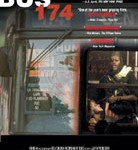When life gets a little too hectic and the pressure starts to mount, there’s nothing quite like kicking back with a beer in hand and good music in the background.
With the seemingly endless number of news outlets at our disposal today, it’s no wonder that we’re constantly inundated with breaking news. We’re now consuming so much media that anything that’s both dramatic and immediate is going to lead the day’s stories. As this happens, I know I’ve become more and more desensitized to a lot of things such as bank robberies, natural disasters, global turmoil and even violent crimes. But every now and again, a seemingly normal lead story will intrigue me, especially if there’s some reporting behind it rather than just dramatic video followed by a vague comment from a scene spokesperson. Bus 174, a striking documentary from Brazil, does just that. It takes a single event that is compelling on its own and then takes it that much further by raising a question that’s easy to ask but not always easy to answer – why?
The date was June 12, 2000, Valentine’s Day in Brazil. For more than four hours, news crews in Rio de Janeiro were broadcasting live from the scene of a hijacking that saw a desperate hood take a bus and its passengers hostage. With the local police unable to get themselves organized, camera men were able to get within a few feet of the scene, literally, and capture dramatic footage that would glue an entire country to their television sets to see it unfold as the hopeless life Sandro do Nascimento comes to a climax.
While it would have been easy to simply recreate the crisis, director José Padilha investigates the surrounding circumstances. He reveals that Sandro grew up an orphan, a witness to his mother’s brutal murder. Without any money in the kitty, Sandro couldn’t put on a cape and cowl and call himself Batman. He became a statistic, a thug, a poor and destitute person with not much of an identity. Padilha feels enough for Sandro to look at the other side of the story. While hijacking a bus is tough to justify in any situation, Padilha looks back in time and challenges Rio’s police force for even more critical moments, such as the senseless massacre of a group of orphans, many of which Sandro was friends with. You can tell from the way Sandro acts that he obviously wanted to get out of it somehow. At the same time he didn’t want to go into custody. Seeing the swarming cameras, Sandro transforms himself into a character as the scenario unfolds. He acknowledges the camera on several occasions as though he were trying to win over the crowds watching at home. It reminded me a lot of Al Pacino in Dog Day Afternoon. I also thought of a notorious Los Angeles freeway pursuit involving a white Ford Bronco and the bystanders cheering the accused on as though he were a hero.
As a medium, film exposes our natural fascination with voyeurism. So it shouldn’t come as a surprise that the most gripping parts of Bus 174 come from the stock news footage. Aesthetically speaking, the composition is awful. It’s too dark and often the reflection from the windows make it hard to tell what’s going on inside unless Sandro is parading himself for the cameras. Yet, what you’re watching is real. It’s raw. Without a script, it’s unpredictable. Anything could happen at any time. So without knowing what happens ahead of time, it’s the ultimate exercise in suspense. But then it’s rounded out with the background information that makes the hostage taking that Valentine’s Day that much more real.
Between Bus 174 and City of God, it has been a marvelous year to be a spectator of Brazilian cinema. Although with the reflective themes of hopelessness, tragedy and inevitability, I don’t think the country’s tourism arm is going to be too impressed, especially considering these are two of the best known international films to make the rounds in 2003.
Bus 174 Gallery















